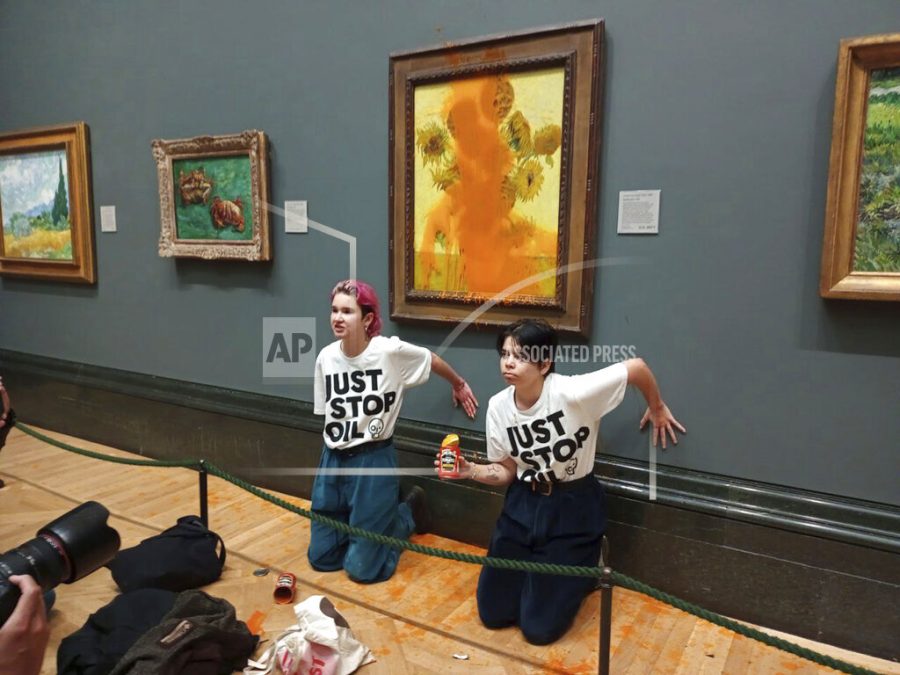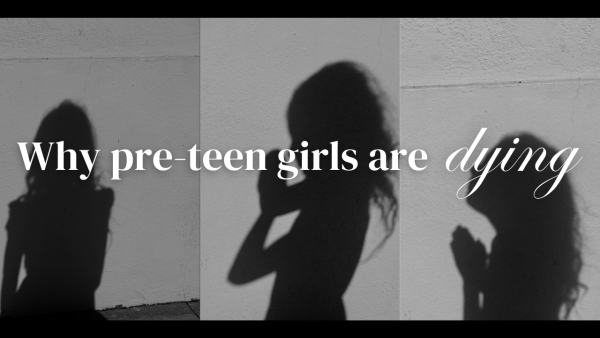Opinion: The Tired Art of Defacing Art
Handout photo issued by Just Stop Oil of two protesters who have thrown tinned soup at Vincent Van Gogh’s famous 1888 work Sunflowers at the National Gallery in London, Friday Oct. 14, 2022. The group Just Stop Oil, which wants the British government to halt new oil and gas projects, said activists dumped two cans of Heinz tomato soup over the oil painting on Friday. London’s Metropolitan Police said officers arrested two people on suspicion of criminal damage and aggravated trespass. (Just Stop Oil via AP)
Climate activism has found a new host to advance its ideals and foundational components with its renowned goal of inflicting shock and forced attention. The painted works of Van Gogh, Monet, and Da Vinci have fallen victim to this new wave of climate rage, this time vented through food products like tomato soup and mashed potatoes. However, defacing art pieces has a precedent throughout history, and even though these provocative protest methods by climate activists are newfound, the act itself is not.
The Mona Lisa, painted by Leonardo Da Vinci, an artist whose works have found a prevalence to succumbing rampages against them, has been a target to a plethora of attacks against it in the past century. The piece has endured hurlings of acid, rocks, yet most notably cake in efforts to display group outrage of a cause like climate change portrayed in news stories today, or just simple and aimless individual frustrations. Nothing gets the message across like vandalizing the most famous painting in the world, right?
The most recently notable episode of performative activism bringing the vandalization ordeal back into the limelight, executed by Just Stop Oil Organization members against Van Gogh’s Sunflowers displayed in the National Gallery of Art in London, has amassed an overwhelming amount of attention, and a majority of it being negative.
The widely viewed video of the activists, now surpassing 10 million views, of them throwing tomato soup at the painting and then subsequently gluing themselves to the wall beneath it is chained with thread after thread of Twitter feeds denouncing and mocking the pair. Thousands of people on and off of the platform are actively pointing out the hypocrisies of their ordeal, specifically towards their wasting of food while simultaneously ranting about global warming induced hunger related poverty, completely shying away from the organization’s goal of outreach.
Over a dozen other incidents following that of the Sunflowers’ have carried out since, with mashed potatoes being launched at Monet’s Les Meules in Germany, and more soup, this time split-pea, being thrown at another Van Gogh piece called The Sower in Italy. Many of these encounters are being recorded and posted to social media by onlookers, and the distaste for those present to witness the theatrics displayed in the videos can be widely heard.
It comes to little surprise that the attempted disfigurations of paintings that popularly adorn people’s hallways or computer backgrounds are being met with vast public disapproval.
Art’s significance through the role it plays in the structure of nations to boost creativity, inspiration, and morale is seemingly overlooked by these perpetrators or vandals. Art carries such importance in America that it was even funded during the era of the Great Depression, in billions, to employ artists and creators to generate works that encouraged innovation and imagination.
The underestimation of art’s influence in society, and our society’s subsequent rejection of efforts to ruin that art, whether intentional or otherwise, prove the organization’s performative pretenses. Such lazy approaches to call attention to significantly important causes like climate change are detrimental to the actual activism these topics need, and are presently hindering their seriousness and potential to increase advocacy.












